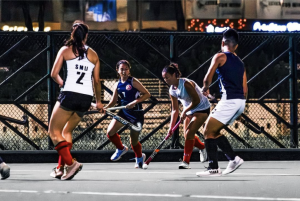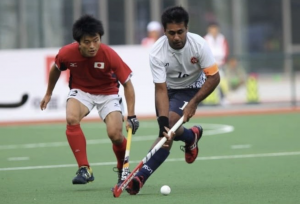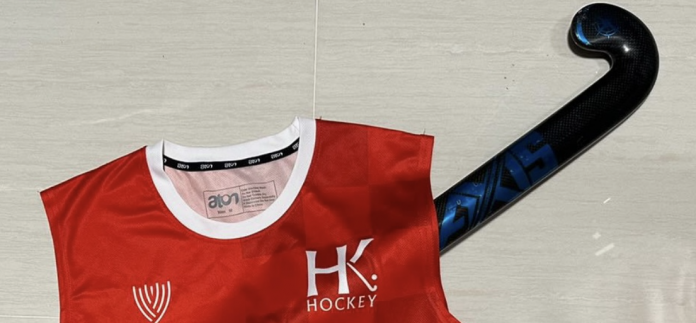A policy change complicates ethnic minorities, long part of Hong Kong’s hockey culture, playing for the Hong Kong team.
By Daniel Koong
Ivy Nina Pieter first started playing hockey in February 2021. In less than three years, she has already become a player for the Kowloon Cricket Club, representing their A team and competing in the women’s premier division. As her hockey skills continue to grow, despite she is now playing at the highest level of the domestic league, it does not satisfy her.
“I do want to play for the Hong Kong team because Hong Kong hockey is only so small. So it is fun to play against different teams and play a bigger tournament, play against better opponents,” the 17-year-old hockey player says. But in reality, she understands that most likely she will never be able to represent Hong Kong due to her nationality.
“Realistically I never gonna able to play for the Dutch national team” Ivy says. “And I don’t want to give up my Dutch passport, so I won’t be able to play for the Hong Kong national team either.” Regarding this, she says she understood herself as being an ethnic minority, and that she cannot represent Hong Kong is reasonable.

Six years ago, Ivy and her family moved from the Netherlands to Hong Kong. During the pandemic lockdown, there was no social activity for her. She decided to follow her mother and started playing hockey with her sister, then she found it interesting. But as soon as she gets more into the sport, she realises that there is a problem with joining the national team.
However, according to Arif Ali, the current head coach of the Hong Kong women’s national field hockey team, the situation was different around ten years ago.
Arif Ali, a Pakistani Hong Kong hockey player retired from the pitch in 2014. He has been representing the Hong Kong national team since 1994, the 44-year-old player witnessed the change.
To him, the relationship between ethnic minorities and hockey in Hong Kong is very close. Growing up in a Muslim community on Shelley Street, Central, he said it was an important place in Hong Kong hockey history.
“The Hong Kong team always had around eight to ten players growing up from Shelley Street. There are Chinese, Nepails, Pakistian and many others. All of them are Muslims.”
He saw so many Pakistani children who lost track of life because of financial difficulties and racism. Still, when they started to engage in sports, they started to focus on life and learn to become responsible young men.
However, outside of the Muslim community, the majority may not even know this sport or have any chance to play.
“Before I see students with different from different ethnicities start making friends with each other when I am teaching courses at schools. But then many schools cut down the courses as they don’t know how important it is,” the current Hong Kong team coach adds. In 2023-2024, only 12 schools participated in the boys’ open grade interschool competition and 9 for girls. Besides, most of them are international schools.
Field hockey is not a popular sport in Hong Kong now, at one point, there were over 2,500 players in the city.
Hockey was first introduced to Hong Kong by British troops stationed in India. Hockey Hong Kong, China(HockeyHK), an association dedicated to the sport, was then founded in 1933.

1964 was a huge year for hockey history even the sports history of Hong Kong. This year, the Hong Kong men’s national hockey team participated in the Tokyo Olympics. It is the first and only time for them to participate in the Olympic games.
At that time, the Hong Kong team featured players from diverse ethnic backgrounds, including those from England, India and Pakistan, but there were no Chinese players. The team has always been having a diverse ethnicity but the
situation has changed in the last decade.
Arif explains the main reason is the policy change of qualification. According to HockeyHK’s latest mail of “National Squad Selection Criteria, Selection Procedure & Appeal Mechanism”, the Asian Hockey Federation has advised the HockeyHK that only HKSAR passports are eligible to represent Hong Kong at international tournaments. Players are therefore required to produce their HKSAR passport as proof of eligibility before they can be considered for selection for the 12th HKQHT. No reason behind is explained.
Ethnic minorities who are born in Hong Kong holding Hong Kong passports are potential Hong Kong team players. But if they are not willing to give up their original nationality, they may not even be able to train with the squad. “When they give up their household registration from their home town, they may also need to give up all their assets there.”
This is also one of the major concerns for Ivy. “The Netherlands is a part of the European Union so with my passport I can go to around 26 countries I think.” She claims that the Netherlands passport is “stronger” so she does not want to give up.
Only players meeting the eligibility criteria for a particular tournament can be considered for selection for that tournament. Non-eligible players may be asked to continue training with the squad during the preparation for a tournament if they are eligible to compete in future tournaments. “The Hong Kong team always relies on players from different ethnic backgrounds. So the policy change affects Hong Kong more than anyone else,” Arif says.
Oson Lam Ngo-sing, is a local hockey player who joined the Hong Kong junior squad seven months ago. But soon he realises there is a problem communicating with the ethnic minority players. “There are five ethnic minority players in the squad and some of them are talented. But I will only communicate with them on the pitch, not making friends with them off the pitch.”

“We are not intentionally ignoring them,” the local hockey player explains. “We will only be speaking in English sometimes during a match. Normally we the local players will be speaking in Cantonese while they will be speaking in their language.”
We have asked the Hong Kong Hockey Association how to ensure that the Hong Kong team can maintain ethnic diversity in light of policy changes. Yet till this moment, we still haven’t received their reply.
Edited by Agnes Lam
Sub-edited by Chloe Tam







































